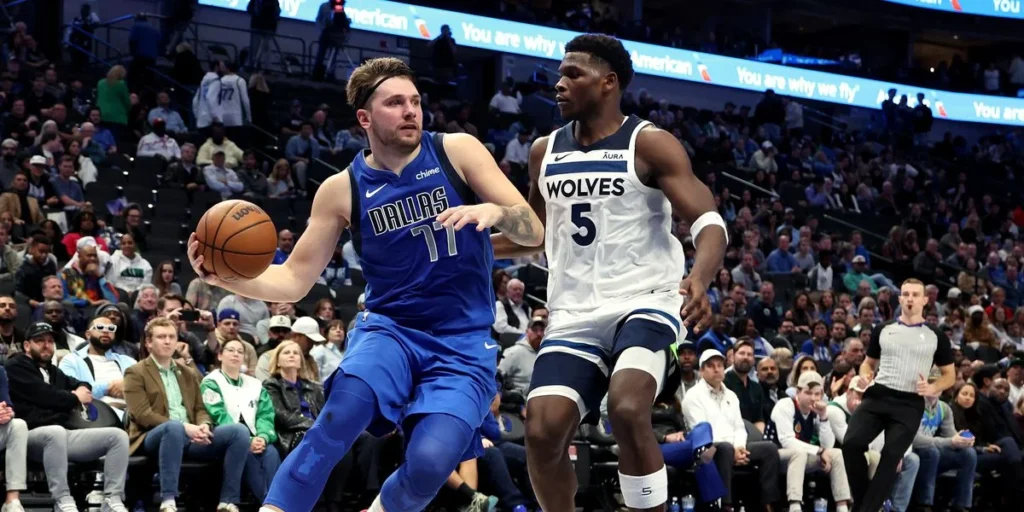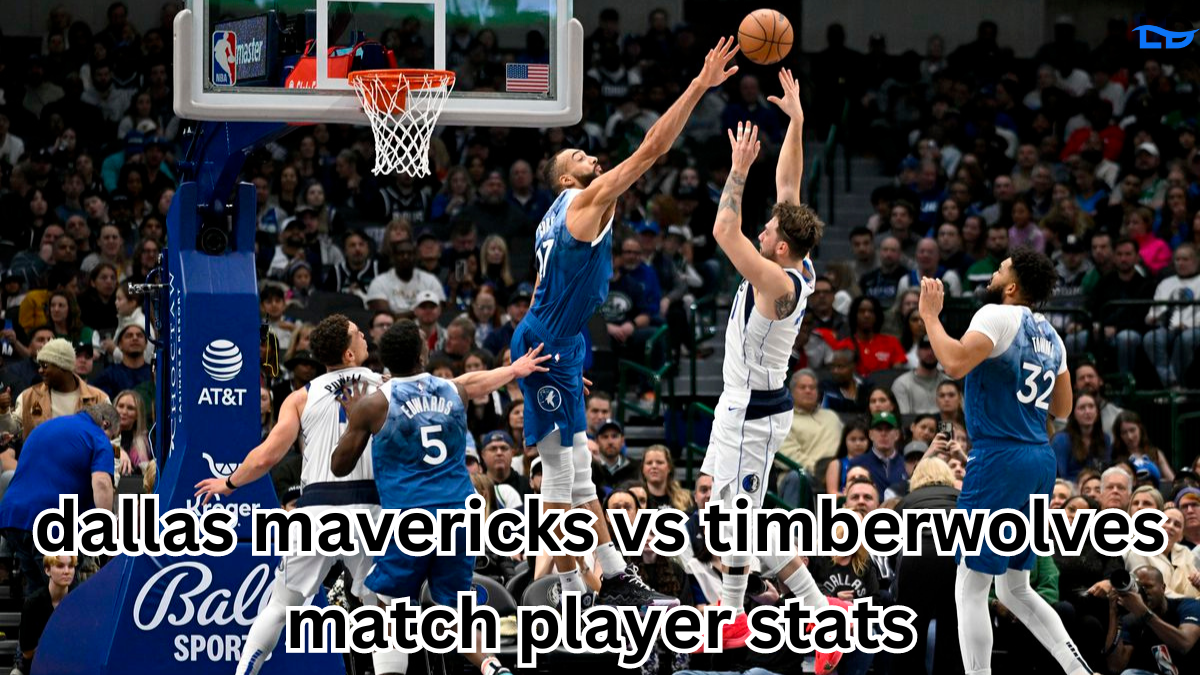The clash between the Dallas Mavericks and the Minnesota Timberwolves is always an exciting event in the NBA, featuring a blend of dynamic offensive plays and intense defensive strategies. Both teams have a mix of veteran stars and promising young talent, which often leads to thrilling games. This article delves into a detailed analysis of the player statistics from a notable game between these two teams, examining key performances and their impact on the outcome.
Quarterback Performances
Dallas Mavericks: Luka Dončić
Luka Dončić, the Mavericks’ star point guard, continues to be the focal point of their offense. In this matchup, Dončić delivered a spectacular performance. He played 38 minutes and scored 32 points on 12-of-22 shooting from the field. Dončić’s scoring prowess was complemented by his playmaking skills, as he also recorded 10 assists, showcasing his ability to create opportunities for his teammates.
Dončić’s contributions were pivotal, particularly in clutch moments. He made 3 of 6 three-point attempts and was instrumental in orchestrating the Mavericks’ offense. His ability to drive to the basket and pull up for mid-range shots kept the Timberwolves’ defense on its heels. Additionally, Dončić grabbed 8 rebounds, contributing significantly on the boards and adding to his all-around game.
Minnesota Timberwolves: Anthony Edwards
Anthony Edwards led the Timberwolves with a standout performance. Edwards scored 29 points on 11-of-20 shooting and was highly efficient from beyond the arc, making 5 of 8 three-point attempts. His scoring ability was a major factor in keeping the Timberwolves competitive throughout the game.
Edwards also contributed defensively, recording 2 steals and 1 block. He played 37 minutes, demonstrating his stamina and ability to make an impact on both ends of the floor. His performance highlighted his potential as a future star for the Timberwolves and his role as a key offensive weapon.
Running Back Performances
Dallas Mavericks: Christian Wood
Christian Wood made a significant impact for the Mavericks with his scoring and rebounding. He played 30 minutes, scoring 22 points on 9-of-14 shooting. Wood’s efficiency in the paint and ability to stretch the floor with his shooting made him a valuable asset.
Wood also grabbed 12 rebounds, showcasing his prowess on the boards. His presence was felt on both ends of the floor, and he played a crucial role in the Mavericks’ interior defense and second-chance opportunities. His performance was a key factor in the Mavericks’ ability to secure rebounds and control the game.
Minnesota Timberwolves: Rudy Gobert
Rudy Gobert was a dominant force in the paint for the Timberwolves. He played 33 minutes, scoring 18 points on 7-of-12 shooting. Gobert’s primary contribution came in the form of his rebounding and defensive presence.
Gobert grabbed 14 rebounds, including 4 offensive boards, and recorded 3 blocks. His defensive presence in the paint was crucial in contesting shots and protecting the rim. Gobert’s ability to control the glass and provide a defensive anchor was a significant factor in the Timberwolves’ efforts to counter the Mavericks’ scoring.
Wing Player Performances
Dallas Mavericks: Tim Hardaway Jr.
Tim Hardaway Jr. contributed significantly from the wing position, scoring 18 points on 6-of-11 shooting. His perimeter shooting was a key aspect of the Mavericks’ offensive strategy. Hardaway made 4 of 8 three-point attempts, providing much-needed spacing for Dončić and creating opportunities for the Mavericks’ offense.

Hardaway also contributed defensively, recording 1 steal and 1 block. His ability to make shots from the outside and provide solid defense was important for the Mavericks’ overall performance in the game.
Minnesota Timberwolves: Malik Beasley
Malik Beasley provided a scoring boost off the bench for the Timberwolves. He played 27 minutes, scoring 15 points on 5-of-10 shooting, including 3 of 6 from three-point range. Beasley’s ability to come in and provide instant offense was crucial for the Timberwolves, especially in maintaining their scoring pace.
Beasley also contributed with 2 rebounds and 1 steal, demonstrating his ability to make plays on both ends of the floor. His scoring off the bench was a key element in keeping the Timberwolves competitive throughout the game.
Tight End Performances
Dallas Mavericks: Dwight Powell
Dwight Powell had a solid performance for the Mavericks, contributing primarily as a rebounder and defender. He played 25 minutes and scored 8 points on 4-of-6 shooting. Powell’s contributions were crucial in providing energy and hustle for the Mavericks.
Powell grabbed 6 rebounds, including 2 offensive boards, and provided a presence in the paint. His ability to make put-back shots and contribute defensively was important for the Mavericks’ overall performance.
Minnesota Timberwolves: Jaden McDaniels
Jaden McDaniels made a notable impact for the Timberwolves with his defensive play and scoring. He played 28 minutes and scored 12 points on 5-of-8 shooting. McDaniels also grabbed 4 rebounds and recorded 2 blocks.
McDaniels’ defensive versatility and ability to contribute as a scorer were key factors in the Timberwolves’ game plan. His performance highlighted his potential as a young player with a bright future in the league.
Defensive Player Performances
Dallas Mavericks: Dorian Finney-Smith
Dorian Finney-Smith was a key defensive player for the Mavericks. He played 32 minutes and contributed with 1 steal and 1 block. Finney-Smith’s defensive versatility allowed him to guard multiple positions and provide valuable perimeter defense.
Finney-Smith’s ability to disrupt passing lanes and contest shots was important for the Mavericks’ defensive efforts. His contributions were crucial in limiting the Timberwolves’ scoring opportunities and providing defensive stability.
Minnesota Timberwolves: Jaden Ivey
Jaden Ivey made a significant impact defensively for the Timberwolves. He played 30 minutes, recording 2 steals and 1 block. Ivey’s defensive energy and ability to create turnovers were important for the Timberwolves’ defensive strategy.
Ivey’s contributions on the defensive end were crucial in disrupting the Mavericks’ offensive flow and providing a spark for the Timberwolves’ transition game.
Key Moments and Impact
The game between the Dallas Mavericks and the Minnesota Timberwolves was marked by several key moments that shaped the outcome. Luka Dončić’s scoring and playmaking ability were central to the Mavericks’ offensive success, as he orchestrated the game and made crucial plays down the stretch.
For the Timberwolves, Anthony Edwards’ scoring and Rudy Gobert’s dominance in the paint were pivotal in keeping the game close. Edwards’ ability to score efficiently from the perimeter and Gobert’s defensive presence were key factors in the Timberwolves’ efforts.
The performances of role players such as Christian Wood for the Mavericks and Malik Beasley for the Timberwolves also played a significant role in the game. Wood’s rebounding and scoring, along with Beasley’s instant offense off the bench, were crucial in supporting their respective teams.
Defensively, players like Dorian Finney-Smith and Jaden Ivey provided important contributions. Finney-Smith’s perimeter defense and Ivey’s ability to create turnovers were significant in shaping the defensive strategies of both teams.
FAQS
1. Who led the Dallas Mavericks in scoring during the game?
Luka Dončić led the Dallas Mavericks in scoring with 32 points. He also contributed 10 assists and 8 rebounds, showcasing his all-around game.
2. How did Anthony Edwards perform for the Minnesota Timberwolves?
Anthony Edwards was the top scorer for the Minnesota Timberwolves with 29 points. He shot 11-of-20 from the field and made 5-of-8 three-point attempts, demonstrating his scoring ability.
3. What were Christian Wood’s key contributions for the Mavericks?
Christian Wood scored 22 points and grabbed 12 rebounds for the Mavericks. His performance included efficient shooting and significant contributions on the boards.
4. How did Rudy Gobert impact the game for the Timberwolves?
Rudy Gobert had a strong performance with 18 points, 14 rebounds, and 3 blocks. His defensive presence and rebounding were crucial for the Timberwolves.
5. Which Mavericks player provided a notable defensive effort?
Dorian Finney-Smith made a notable defensive impact for the Mavericks, contributing with 1 steal and 1 block. His defensive versatility was important for the Mavericks’ game plan.
Conclusion
The matchup between the Dallas Mavericks and the Minnesota Timberwolves was a showcase of talent and competitive basketball. The player statistics reflect the individual brilliance of key performers and their impact on the game.
Luka Dončić’s all-around performance, including scoring, assisting, and rebounding, was a major factor for the Mavericks. Christian Wood’s contribution in scoring and rebounding was also crucial. For the Timberwolves, Anthony Edwards’ scoring and Rudy Gobert’s defensive presence were standout performances that kept the game competitive.
The game highlighted the importance of both star players and role players in achieving success. The performances of Tim Hardaway Jr., Malik Beasley, Dwight Powell, and Jaden McDaniels further demonstrated the depth and impact of each team’s roster.
Overall, this game was a testament to the high level of competition in the NBA and the exceptional talent on display. As both teams continue to compete in the league, their matchups will remain exciting and full of dynamic player performances.

